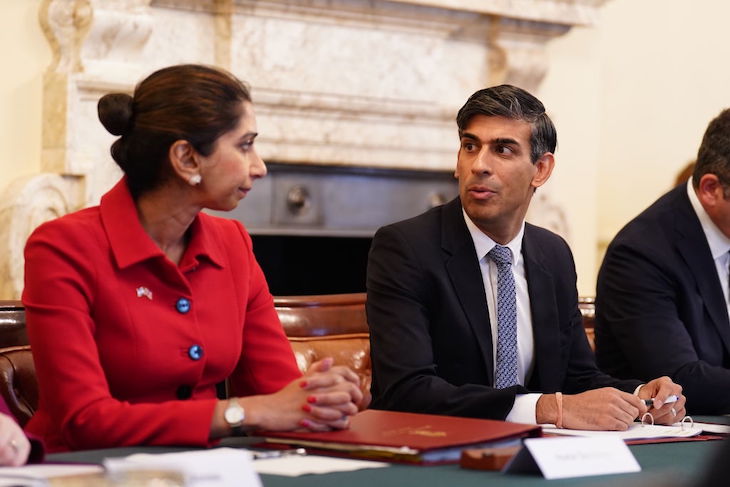Conventional wisdom about politics isn’t quite always wrong: it is merely shown by the passage of events to have been in error in the vast majority of cases. Consider the unhappy relationship between Rishi Sunak and Suella Braverman over immigration policy. The Westminster Village – media and political practitioners alike – generally accepted that Sunak was super-smart and at heart one of the ‘grown-ups’ in the Tory party.
Braverman, by contrast, was widely mocked, accused of being a lightweight in legal matters, said to be hopelessly out of her depth in high office and depicted as a comical entrant into the first Tory leadership contest of 2022.
All of which is rather strange. Because this week Sunak is belatedly implementing policies designed to win back lost voters on the issue of immigration in both its legal and illegal forms. And everything he is doing is stuff Braverman told him to do a year ago if he wanted to retain electoral credibility on what is a totemic issue for Conservative-leaning voters.
Sunak’s fundamental ineptitude at politics and lack of antennae for the popular mood was shown up again
His new Home Secretary James Cleverly has just announced a raft of measures to reduce legal immigration: higher earnings thresholds, a clampdown on bringing in dependants and the like. As Braverman posted on social media last night: ‘I put forward similar measures six times in the last year. I’m glad that the Prime Minister has finally agreed to introducing some of them…but the delay has reduced their impact.’
It would take a bold observer now to query her additional advice to Sunak that: ‘We should go further: shortening the graduate route – not just reviewing it again; and we need an annual cap, set by Parliament, across all visa routes, so we don’t get into this terrible situation again.’
Braverman is not only ahead of the game on the efficacy of measures but also on the politics of the matter. For by delaying a crackdown, Sunak has burned through huge quantities of political capital. And now he is widely suspected of not proactively seeking to lower immigration, but rather of being driven to do so against his will in the wake of an eminently predictable rise in the polls for the Reform party.
He has compounded this misreading of public opinion by lapsing into another weakness of his: that of overclaiming. Last night he said in a tweet: ‘We’ve just announced the biggest ever cut in net migration. No prime minister has done this before in history.’
Yet this ‘cut’ is stuck firmly in the realm of an unachieved ambition that is highly unlikely to have come good by the time of the next election. It is true that no prime minister before has delivered it, but neither has the current one.
And plodding Cleverly has inadvertently blown the whistle on its inadequacy anyway by putting a number on the reduction on net immigration it will achieve: 300.000. It doesn’t take a Winchester College maths whizz to work out that this will leave the figure still nudging 400,000, which is much higher than it was in 2019 when the Tory manifesto promised a reduction.
Sunak’s fundamental ineptitude at politics and lack of antennae for the popular mood was shown up again in an interview with the Sun newspaper overnight. He told it: ‘People are rightly angry about record numbers of migrants coming to our country…enough is enough, it is time to get control of immigration once and for all.’
Yet in April, despite all Braverman’s entreaties, he was supremely relaxed about legal migration in an interview with Paul Goodman of the Conservative Home website, claiming: ‘The most important question, the thing that everyone talks to me about, is not that. It’s the boats.’ I wrote a piece on this site at the time warning that he was deluded in this belief.
It is a very similar story on illegal migration. Braverman voiced her worries to Sunak that the Illegal Migration Act was not sufficiently robust to protect the Rwanda scheme against human rights-based challenges in the courts. She wanted specific clauses inserted disapplying human rights constraints whether originating in domestic law or international treaties. She also told him not to take it for granted that the Supreme Court would rule the policy lawful and warned that he needed a Plan B. He ignored her on all counts.
Yet here he is this week pushing yet more emergency legislation through the Commons designed to reinvigorate the ailing Rwanda project and sending Cleverly to shake hands on a new treaty with that country, but only after being widely viewed as having failed to pass his own test to ‘strain every sinew’ to stop the boats.
Frustration is rising among many government insiders about these shortcomings. ‘Action is only happening because the riot act has been read,’ one told me. Another ministerial source added: ‘If only it had happened sooner and not (after much) kicking and screaming.’
When our phenomenally bright Prime Minister gets everything wrong while his discredited former home secretary is shown to have got everything right, we may find ourselves asking whether these characterisations were always topsy turvy. Is there a dud in Downing Street? It looks that way to me.







Comments